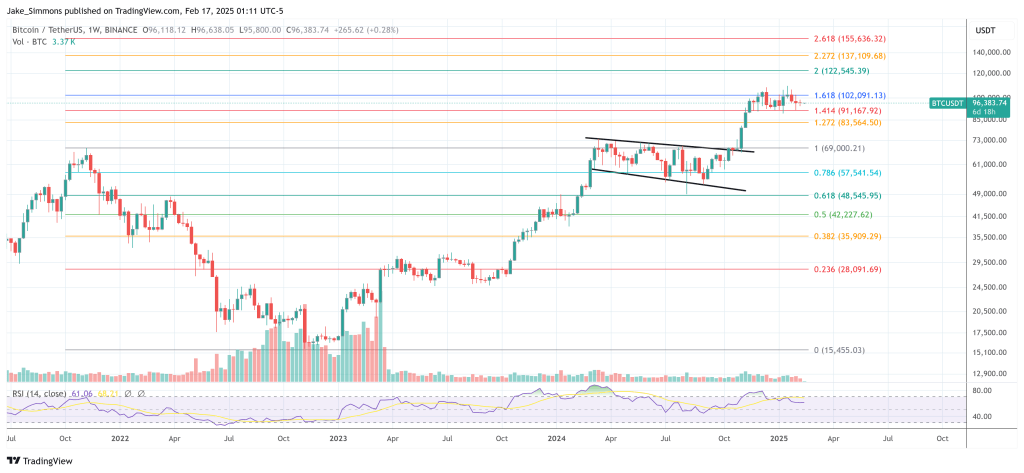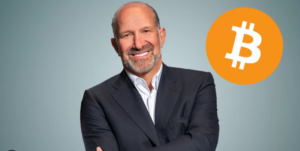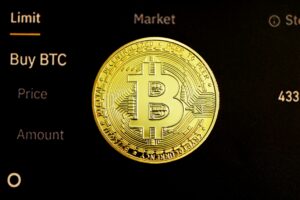‘Game On For Bitcoin!’ Musk’s DOGE Questions Gold Reserves
In a weekend exchange on X, Elon Musk was nudged to extend his cost-cutting Department of Government Efficiency (DOGE) to one of the most heavily guarded sites in the United States: Fort Knox, the US Army installation famously said to hold 4,580 tons of gold. The discussion, which drew in voices ranging from the Bitcoin community to sitting lawmakers, has reignited decades-old questions about the transparency and actual contents of America’s gold vault.
Musk Sparks The Conversation
It all began when financial news aggregator Zerohedge (@zerohedge) tagged Musk, suggesting, “It would be great if @elonmusk could take a look inside Fort Knox just to make sure the 4,580 tons of US gold is there. Last time anyone looked was 50 years ago in 1974.”
The tweet, viewed by 1.9 million users and liked over 59,000 times, prompted Musk to ask: “Surely it’s reviewed at least every year?” Zerohedge promptly replied: “It should be. It isn’t.”
From there, the online community swelled with reactions, speculation, and suggestions. Questions about the last comprehensive audit of the Fort Knox depository have resurfaced, along with persistent rumors that the stash has been sold off or otherwise depleted.
Not long after, Sen. Rand Paul (R-Ky.), 62, joined the conversation with a succinct endorsement of a formal inspection, remarking: “Nope. Let’s do it,” in response to Musk’s musings. Paul’s father, former Rep. Ron Paul (R-Texas), has a long history of calling for greater transparency around the United States’ gold reserves. Back in the 1970s, Ron Paul famously raised concerns that the gold might not be as secure—or as plentiful—as long believed.
The most recent known visits to Fort Knox appear to be in 1974, when journalists and members of Congress were permitted to step inside, and 2017, when the facility briefly opened its doors to former Treasury Secretary Steve Mnuchin. Even so, there is no publicly available record of a full, comprehensive audit in recent decades, fueling conspiracy theories that the gold may not be in Fort Knox at all.
Estimates suggest that if the vault does indeed hold 4,580 tons of gold, it would be worth approximately $425 billion at current market rates.
Implications For Bitcoin
The spark of skepticism around Fort Knox’s holdings quickly fed into a larger conversation about Bitcoin’s verifiability. Nate Geraci, President of the ETF Store and Co-Founder of the ETF Institute, remarked how BTC could eliminate doubts over ownership. “If only there were a technological solution that would allow anyone to independently verify ownership of an asset,” Geraci said, adding, “Btw, if for whatever reason Ft Knox doesn’t actually have the gold… It’s absolutely game on for btc. IMO, the gold is there. But at least now everyone might fully appreciate real-time & foolproof verification of asset ownership.”
Others echoed that sentiment. Dennis Porter, CEO and founder of Satoshi Act Fund, emphasized Bitcoin’s around-the-clock transparency: “Another reason why states (and the federal government) should prefer Bitcoin instead of gold. The public can audit government-bitcoin-holdings 24/7/365. The last extensive audit of our gold reserves happened… over 70 years ago.”
Meanwhile, US Senator Cynthia Lummis, a longtime Bitcoin advocate who serves as the Senate Banking Subcommittee Chair on Digital Assets under US President Donald Trump, underscored the necessity for a modernized approach: “Bitcoin fixes this. A bitcoin reserve could be audited any time 24/7 with a basic computer. It’s time to upgrade our reserves.”
Some took the scenario to imaginative extremes, predicting potential outcomes if a Fort Knox audit revealed significantly less gold than is officially reported. Walker, host of THE Bitcoin Podcast, posted a detailed hypothetical chain of events, beginning with an Elon Musk-inspired audit, followed by a discovery that Fort Knox holds “less than 500 tons of gold.”
From there, he speculated an executive order might be issued by Trump to form a Strategic Bitcoin Reserve, triggering international competition for Bitcoin while undermining gold’s market standing. By the end of Walker’s sweeping scenario, “China and Russia realize Trump got the jump on them and start trying to acquire Bitcoin,” leading to a collapse in gold’s value relative to Bitcoin—while vocal gold proponent Peter Schiff becomes, as Walker put it, “admitted to a mental hospital.”
Here’s what’s going to happen:
1. Elon pushes Trump to audit Fort Knox.2. Audit reveals there is less than 500 tons of gold.3. Trump realizes China and Russia have way more gold than the U.S., but very little Bitcoin.4. Trump issues EO for Strategic Bitcoin Reserve, citing… pic.twitter.com/hQrAk7vMj1
— Walker (@WalkerAmerica) February 16, 2025
Eric Balchunas, a Bloomberg ETF analyst, responded to Walker’s bold prophecy with measured skepticism, asking: “What a prediction. What % chance would you give of this actually happening?”
Whether these audits come to fruition remains unclear. As of this writing, there has been no official confirmation from the US Treasury or the Department of Defense to open Fort Knox for a comprehensive public review. Still, a Fort Knox audit could have massive implications for the gold price and also potentially for the digital gold, Bitcoin.
At press time, BTC traded at $96,383.

Featured image created with DALL.E, chart from TradingView.com








